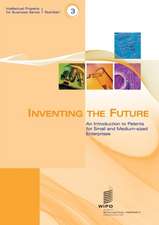Confronting Biopiracy: Challenges, Cases and International Debates
Autor Daniel Robinsonen Limba Engleză Hardback – 24 feb 2010
The book synthesizes the rise of the issue and increasing use of the term by activists and negotiators in the World Trade Organization (WTO) and the Convention on Biological Diversity (CBD), to form a critical understanding of the themes, implications and politics of biopiracy. Taking a case-study based approach, derived from interviews and fieldwork with researchers, government, industry, local farmers, healers and indigenous people, the author sequentially documents events that have occurred in biopiracy and bioprospecting controversies. Implications and ethical dilemmas are explored, particularly relating to work with local communities, and the power relations entailed. Detailing international debates from the WTO, CBD and other fora in an accessible manner, the book provides a unique overview of current institutional limitations and suggests ways forward. Options and solutions are suggested which are relevant for local communities, national governments, international negotiators, NGO and interest groups, researchers and industry.
| Toate formatele și edițiile | Preț | Express |
|---|---|---|
| Paperback (1) | 322.52 lei 6-8 săpt. | |
| Taylor & Francis – 3 aug 2011 | 322.52 lei 6-8 săpt. | |
| Hardback (1) | 765.77 lei 6-8 săpt. | |
| Taylor & Francis – 24 feb 2010 | 765.77 lei 6-8 săpt. |
Preț: 765.77 lei
Preț vechi: 1028.35 lei
-26% Nou
Puncte Express: 1149
Preț estimativ în valută:
146.55€ • 152.43$ • 120.98£
146.55€ • 152.43$ • 120.98£
Carte tipărită la comandă
Livrare economică 14-28 aprilie
Preluare comenzi: 021 569.72.76
Specificații
ISBN-13: 9781844077229
ISBN-10: 1844077225
Pagini: 206
Dimensiuni: 156 x 234 x 18 mm
Greutate: 0.54 kg
Ediția:1
Editura: Taylor & Francis
Colecția Routledge
Locul publicării:Oxford, United Kingdom
ISBN-10: 1844077225
Pagini: 206
Dimensiuni: 156 x 234 x 18 mm
Greutate: 0.54 kg
Ediția:1
Editura: Taylor & Francis
Colecția Routledge
Locul publicării:Oxford, United Kingdom
Cuprins
Introduction 1. Collecting; Prospecting; Piracy 2. International Legal Backdrop 3. Patent-Related Biopiracy Cases 4. Non-Patent Biopiracy Cases 5. Implications and Ethical Dilemmas: What have the Cases Shown? 6. Current Debates and Ways Forward: Internationally and Regionally 7. Current Debates and Ways Forward: National and Local Approaches. Conclusions
Notă biografică
Daniel F. Robinson is Lecturer at the Institute of Environmental Studies, University of New South Wales, Australia
Recenzii
'Biopiracy has emerged as a powerful concept inspiring critical perspectives on the commercial use of biodiversity and traditional knowledge. But what does it really mean? This well-researched and thoughtful book provides a thorough investigation of the theory and practice of biopiracy that scholars and policymakers alike will find illuminating.' Graham Dutfield, Professor of International Governance, University of Leeds, UK
'Daniel Robinson's timely and authoritative book will inform the contemporary, but until now unproductive, discussions in WIPO and the WTO about ways in which spurious intellectual property claims over biological resources and traditional knowledge can be sanctioned as 'biopiracy'.' Michael Blakeney, Herchel Smith Professor of Intellectual Property, Queen Mary, University of London, UK
'The book is engaging, thoroughly researched, and well organized and an excellent and accessible read for scientists, industry managers, policy makers, and community leaders. It is also unusually evenhanded.' -Kate Davis, Botanic Gardens Conservation International, in 'Conservation Biology'.
'An essential guide to the complex legislation that has made biopiracy possible.'-Chris Edwards, Engineering & Technology
'The book is thorough, detailed and well researched and lends renewed credibility to the biopiracy discourse. It will provide a useful resource for students and teachers with an academic interest in bioprospecting and its legal and ethical dimensions.' - Tim O’Higgins, Biological Conservation
'For anyone who is interested in the topic of biopiracy, this book is a must read.' Paul Elliott, Journal of Biological Education
'Drawing on the case studies, and using convincing arguments, the author shows how biopiracy leads to injustice and inequity in the use of genetic materials and knowledge around them, in addition to over-exploitation of the biodiversity. A key reason for inequity is, as the author demonstrates, the exclusion of the developing country producers from the production and sale of the genetic material after a patent is established elsewhere. And the book also points to the overlapping of legal jurisdiction of patenting and compliance, which further disadvantages the communities and public agencies in the developing countries.' - Hemant R Ojha, Asia Pacific Viewpoint The University of New South Wales, Australia
'Daniel Robinson's timely and authoritative book will inform the contemporary, but until now unproductive, discussions in WIPO and the WTO about ways in which spurious intellectual property claims over biological resources and traditional knowledge can be sanctioned as 'biopiracy'.' Michael Blakeney, Herchel Smith Professor of Intellectual Property, Queen Mary, University of London, UK
'The book is engaging, thoroughly researched, and well organized and an excellent and accessible read for scientists, industry managers, policy makers, and community leaders. It is also unusually evenhanded.' -Kate Davis, Botanic Gardens Conservation International, in 'Conservation Biology'.
'An essential guide to the complex legislation that has made biopiracy possible.'-Chris Edwards, Engineering & Technology
'The book is thorough, detailed and well researched and lends renewed credibility to the biopiracy discourse. It will provide a useful resource for students and teachers with an academic interest in bioprospecting and its legal and ethical dimensions.' - Tim O’Higgins, Biological Conservation
'For anyone who is interested in the topic of biopiracy, this book is a must read.' Paul Elliott, Journal of Biological Education
'Drawing on the case studies, and using convincing arguments, the author shows how biopiracy leads to injustice and inequity in the use of genetic materials and knowledge around them, in addition to over-exploitation of the biodiversity. A key reason for inequity is, as the author demonstrates, the exclusion of the developing country producers from the production and sale of the genetic material after a patent is established elsewhere. And the book also points to the overlapping of legal jurisdiction of patenting and compliance, which further disadvantages the communities and public agencies in the developing countries.' - Hemant R Ojha, Asia Pacific Viewpoint The University of New South Wales, Australia
Descriere
The aim of this book is to provide the most detailed, coherent analysis of the issue of biopiracy to date. The book synthesises the rise of the issue and increasing use of the term by activists and negotiators to form a critical understanding of the themes, implications and politics of biopiracy.









